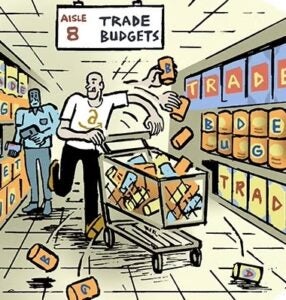 “Data Driven Thinking” is a column written by members of the media community and contains fresh ideas on the digital revolution in media.
“Data Driven Thinking” is a column written by members of the media community and contains fresh ideas on the digital revolution in media.
Today’s column is written by Rob Leathern, CEO of XA.net, an online advertising company.
Magic (illusion), the art of appearing to perform supernatural feats using sleight of hand or other methods.
Building businesses by driving sales and customers is exciting. Sales or “conversions” is the most fun column to see going up, always. At a previous company I can remember vividly the first day running one of the $100k+ front-page placements for a day, and the excitement the team had when we crossed the breakeven line and started making money.
Seeing thousands of real-time bids whiz by in a second, can generate the same excitement that one gets from running the big media buys. Real-time bidding is a lot of fun, especially for media and technology geeks working to figure out how to use the most meaningful parts of all that data that is being generated every second.
Real-time bidding volume is still pretty small right now compared to the overall US display market – the volumes and the quality of the inventory are still relatively low (often mediocre sites or good sites with later-session impressions), and the technology on both the buying and selling side is still nascent, but it is very, very promising. Real-time bidding media buying is a lot like other media buying – making it work at scale is going to take technology, media dollars and lots and lots of testing (read: hard work).
Media buying is not magic.
It’s an unending cycle of setup, test, measure, model, narrow, expand, and repeat. Automation in workflow and analysis is essential to reduce the “human quotient” of these tasks, and the number of Excel round-trips. The dirty secret though, is that there is no secret. No secret black-box algorithm exists that will solve all your media buying problems. No matter whether your media-buying partner tells you that someone on their team has done the sums to put a man on the moon, a probe into space, or even proven that every simply connected, closed 3-manifold is homeomorphic to the 3-sphere (I tried to hire that guy – didn’t work out…J), it’s as much going to come down to automating workflow and retaining centrally the learnings that accrue from every ad campaign, impression and click that the advertiser runs, as it is enjoying the taste of that oh-so-secret sauce.
Going back to my previous example, for every “bet the farm” big placement you do, there should be hundreds of little mini-tests you run in the days and weeks beforehand to simulate in some way what the best creatives are going to be to run in that slot. Find something that works great? Cool, run that, but save some space for something new and not entirely proven because for every amazing creative that seems to work great, there is always a better one out there. Media buying is full of local peaks that seem to be the tallest around, but with a bit of exploration turn out to be trumped by a peak further off.
“Secret magic” can be a bit of a binary thing – if it works then it’s great, but if it doesn’t, then you’re left without knowing what to do because it was secret and/or magic, and that means you don’t really know how it worked or why. It’s also harder for other people to plug their data into or pull their data out of secret magic; purveyors of secret magic tend to get upset about people seeing even the first derivative of said secrets/magic lest you reverse engineer it.
Most importantly, if you have a great secret way to make media perform, you should probably use it yourself to make media perform and get paid on a per-sale basis – you’ll probably make more money doing that than hiring it out to people or taking a low-margin agency fee. Sell them your services on a CPA (or even, gasp, a CPC) and take it to the bank.
If there is any magic in media buying, it is this: I believe the future will be an advertiser-centric one, where everything is oriented around the extent to which advertisers want to take on customer acquisition risk. Instead of thinking about quarterly and monthly dollar spends, marketers will instead think about the number of customers they want to acquire that month. All kinds of new marketing service providers will step in to take on those risks and deliver those numbers, or provide the tools for advertisers to do it themselves.
Instead of buying and packaging impressions and clicks, the future of media is packaging and trading customers, accounts and sales. The biggest magic in media buying will eventually be, that there will be no media buying at all.
Follow Rob Leathern (@robleathern), XA.net (@xa_net) and AdExchanger.com (@adexchanger) on Twitter.











